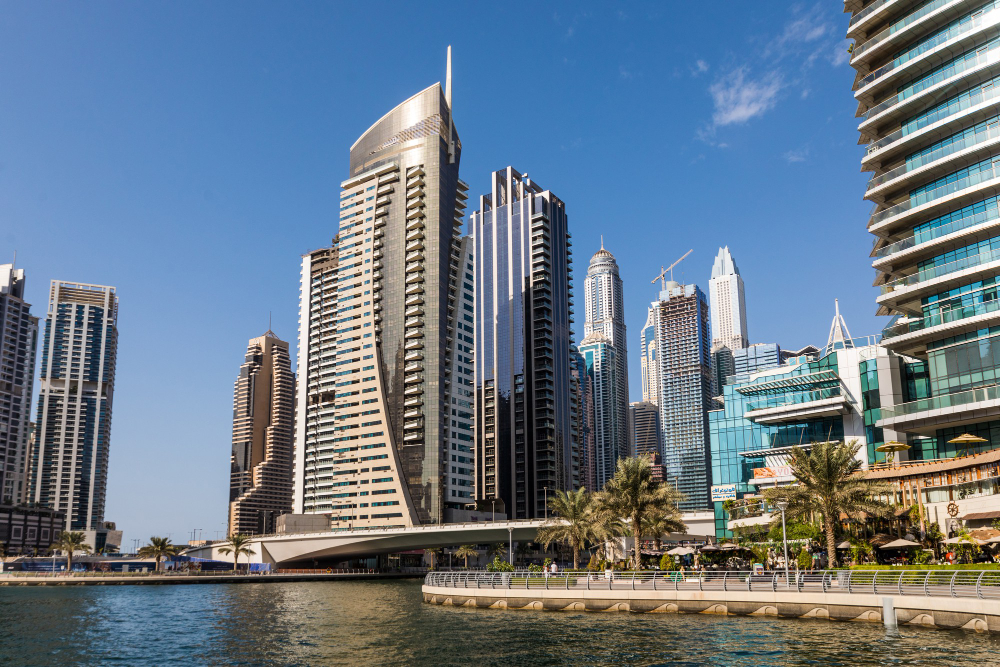Written by Viyaliy Chiryassov, CEO of UPPERCASE.
In 2023, global investment in fintech fell by 48% — that is, everywhere except in the UAE, where investors instead doubled down on fintech, injecting a whopping 92% more capital than the year before.
Part of the reason is the country’s increasingly supportive regulatory environment for fintech. The UAE is quickly becoming a global fintech hub. According to Fintech Magazine, Dubai is now ranked 6th in the world for its fintech ecosystem, and its position continues to strengthen.
In this article, we’ll take an overview of the fintech market in the UAE and talk about why it has managed to buck global trends, and why new fintech startups should consider it as their launchpad.
Fintech Market in the UAE: Statistics and Trends
Let’s start by talking numbers. In 2023, the UAE has for the first time entered the list of top 10 best-funded fintech hubs, while other countries on the list, particularly France and Germany, experienced a decline. In line with this upward trend, most major fintech metrics in the UAE are expected to grow in the coming years.
In 2024, the UAE’s fintech market is estimated to have USD 3.16 billion in assets under management, and this figure is projected to reach USD 5.71 billion by 2029, at a CAGR of 12.56%. More specific metrics also showcase growth, especially in the neobanking segment. There, the average transaction value per user is estimated at USD 27,800 in 2024, and according to forecasts, it will reach $37,800 by 2028.
This creates a favorable environment for investors, and financial support in the market is increasing. In 2024, the volume of assets under management in the Digital Investment market amounted to USD 4.4 billion, and by 2028, this figure will grow to USD 5 billion. The market’s growing profitability is creating a favorable atmosphere.
Overall, it’s a very bullish outlook, and it means that fintech companies starting in the UAE can access several advantages. We discuss them in detail below.
Advantages of opening a fintech market in the UAE
A strong but fragmented market.
The UAE’s fintech market is considered fragmented, meaning that instead of a single player monopolizing the entire space, many players specialize in various sub-verticals. This fragmentation allows fintech companies to focus on specific niches, such as Islamic fintech, blockchain-based solutions, or AI-driven lending platforms. For example, the Islamic fintech market, a subvertical relatively unique to the MENA region, is expected to grow at a CAGR of 24% until 2025, reaching USD 11 billion in the UAE alone. This is just one of the many fragmented verticals where new companies can find room to maneuver and outperform existing players.
At the same time, increased competition leads to better products, and this manifests in the high adoption rate of fintech in the UAE, further fueling market growth. For instance, transactions by international cards increased by 23% during 2023, and approximately 83% of individuals in the region tried alternative payment methods like mobile contactless payments or cryptocurrencies. This creates a market that is ready for new solutions.
Robust Government Support
Of course, the fintech ecosystem in the UAE couldn’t have flourished to this extent without government support. For example, the Dubai Financial Services Authority (DFSA) is a fintech regulator in the Dubai International Financial Centre (DIFC) — a Dubai Free Zone. The DFSA proactively supports fintech startups with initiatives like Innovation Testing License, a restricted financial services license that allows fintech firms to test their concepts in the DIFC.
Another initiative that’s worth highlighting is the FinTech Office, launched by the UAE Central Bank in 2020. It serves as a single point of contact for fintech companies, guiding them through regulations and helping them secure partnerships with traditional financial institutions.
Free Zones that support Fintech Companies
The UAE’s Free Zones provide companies with benefits like 100% foreign ownership, possibility to reduce the income tax rate, and no restrictions on capital repatriation. Free Zones also provide a streamlined business setup process, though this simplicity depends on each Free Zone. For fintech, the main free Zones in the UAE are:
- Dubai International Financial Center (DIFC)
- Dubai Internet City (DIC)
- Dubai Silicon Oasis (DSO)
- Abu Dhabi Global Market (ADGM)
Fintech-accelerators in the UAE
The UAE has established a robust ecosystem of fintech-accelerators that nurture and support the growth of fintech startups. These accelerators offer mentorship, networking opportunities, and access to funding — all of which is a must for early-stage fintech companies. Here are some of the most prominent fintech-accelerators in the UAE:
- DIFC FinTech Hive: Established in 2017, the FinTech Hive is the first fintech accelerator in the region. It has successfully accelerated over 100 fintech startups, helping them secure more than $200 million in funding. The accelerator offers a 12-week program that connects startups with potential investors and industry partners, while also providing access to mentorship and workshops.
- Mohammed Bin Rashid Innovation Fund (MBRIF) Accelerator: This initiative launched by the UAE Ministry of Finance supports innovation across various sectors, including fintech. The accelerator offers financial support, mentorship, and access to a network of investors and industry partners.
- Plug and Play ADGM: A global innovation platform that connects fintech startups with corporations and investors. It offers a 12-week accelerator program that provides startups with mentorship, workshops, and the opportunity to pitch to potential investors.
Skilled Fintech Professionals in the UAE
The UAE is a magnet for top talent from around the world, thanks to its status as a global financial hub, advanced IT infrastructure, and the high standard of living in its major cities. This makes it easier for businesses in the UAE to find people with the right skills and mindset compared to many other countries. After all, a company is only as strong as its workforce, so having access to a diverse pool of talented individuals is crucial for success.
Fintech Free Zones in the UAE
We’ve already mentioned above that Free Zones provide various support to fintech startups. Let’s cover some of the best Free Zones for fintech companies and what advantages they offer.
Dubai International Financial Centre (DIFC)
The DIFC is perhaps the most famous Free Zone for Fintech startups in the UAE. However, despite the fact that many companies want to establish themselves there, only around 5,500 are registered as of 2023. This is because the DIFC provides access to a large pool of financial institutions, including its own accelerator — Fintech Hive, which helps startups develop and test solutions in collaboration with major financial institutions. The DIFC Innovation Hub has strict criteria for selecting residents; companies must demonstrate the innovation of their products to a special committee.
Dubai Internet City (DIC)
Dubai Internet City is another Dubai-based Free Zone with a focus on technology and fintech. Similarly to DIFC, it offers a dedicated startup program, In5 Innovation, which has supported over 200 startups since its inception in 2013. In5 provides access to funding, mentorship, training, and networking opportunities, as well as a co-working space and prototyping lab. DIC has a community of over 24,000 professionals, and hosts over 200 technology events annually, including the STEP Conference, which about 6,000 attendees from around the world.
Dubai Silicon Oasis (DSO)
DSO is another Dubai-based Free Zone focusing on technology. It provides a streamlined business setup process, with licenses issued within 5 working days. The Free Zone has a dedicated technology park, Dubai Technology Entrepreneur Campus (Dtec), which is the largest tech hub in the MENA region — it hosts more than 1000 startups from 72 countries and provides access to funding, mentorship, training, and networking.
Abu Dhabi Global Market (ADGM)
ADGM is located on Al Maryah Island in Abu Dhabi. This Free Zone, which operates under a common law jurisdiction, has its own civil and commercial laws and court system. It is well-known for its dedicated fintech regulatory framework — the “Regulatory Laboratory” (RegLab), which allows fintech companies to test and develop innovative solutions in a controlled environment. RegLab has supported over 100 fintech startups since its launch in 2016, with participants benefiting from a two-year regulatory sandbox period.
Wrapping up
The UAE fintech market is a standout in the global landscape: it’s bucking the global downward trends seen in other regions, has a supportive regulatory environment, and offers access to a population that is more than ready to embrace fintech services. For fintech startups looking to establish themselves in a market set to reach $5.71 billion by 2029, the UAE isn’t just a mirage in the desert — it’s a very real oasis with real opportunities.


